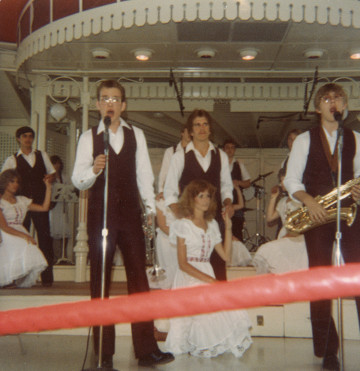In November, when the American Fork High School Marching Band was in Indianapolis for Grand Nationals, I wrote something that made lots of band moms cry. Apparently, it did the same for some of the band dads, too — presumably, the ones who are secure in their masculinity. There are three published versions: the original, an edited and dramatically condensed version in a local online newspaper, and this one, which is my favorite.
I was honored by an invitation to speak for a few minutes at the band’s season-ending dinner several days later, so I turned the essay into a speech. It shows the passage of a few days, the shift in audience from the community to the band itself, and some of the things we do differently when writing for the ear instead of the eye. Here it is, approximately as I delivered it to a gracious, youthful audience of champions.
(This was originally published at my old blog, LocalCommentary.com, on November 22, 2013.)
I am well aware that no one in the room tonight has contributed less to the wonderfully successful season you are celebrating tonight than I have. I’m honored to be here with you tonight to say to you, face to face, that the American Fork High School Marching Band is the big, thumping heart of American Fork, Utah.
We marvel at how long and hard you work. Then you work harder and longer.
We rejoice at how good you look. Then you find ways to look better.
And your sound . . . Much as we all adore the color guard, your sound is my favorite part of every show. Your sound teaches us why we have bands at all.
The trumpet I played when I was in school went to Grand Nationals last week with one of you, which is a happy thought for me. I loved playing the trumpet, but I didn’t love marching band. I didn’t even like marching band. Only in recent years have I acquired the taste. I can tell you exactly when it happened. It was the moment when I comprehended how much this band means to this community.
True, the city is full of current and former band members and their families, and most people in American Fork at least have a neighbor who is somehow connected to the band. But what’s happening here is bigger than that. Even people with no personal connection to the band or the school, and with little interest in band music, are somehow drawn into a remarkable world.
How remarkable? I don’t want to sound condescending, but I want to say that the world you have created is more remarkable than you realize. You can sit in the stadium at a competition – I have done this – near the bands American Fork routinely defeats, and hear drum majors telling their bands, “Be sure to be back here in time to cheer for American Fork. They always cheer for us.” Maybe that sounds like a small thing. It is not a small thing.
I wish I could have been in Indianapolis to see you perform. As it was, a lot of people gathered here to watch the live video feeds. You never saw a happier or prouder audience.
Just being good enough to be at Grand Nationals this year or any year was a triumph. Performing well in the preliminary round was another. Giving the best performance of the season in your last performance, which happened to be in the semifinals, was a crowning triumph, even if we all hoped you’d get to perform one more time. Leaving it all on the field or the stage or the court is just about as good as it gets in music or theater or sports. I can’t say I didn’t care where you placed last weekend, but it doesn’t matter much in the grander scheme of things. I value much more what you had already won – or, in other words, what you had already seen and learned, and what you became in the process.
You learned by experience how much harder it is to be excellent than merely good. You learned first-hand, before you ever went to Indianapolis, to pay the even higher price of being great at something, which you are. You learned how to be a team, and how to perfect hundreds of individual performances and knit them into something spectacular and intricate and beautiful.
Your morale and unity are enviable. You’d think that all the winning might make you insufferably proud, but you’ve learned to take success gracefully. You win, then you come home and work harder. And somehow you still walk from place to place, instead of strutting.
We might call the price of these lessons great sacrifice, but you in the band and we parents and neighbors get so much back for the work, the time, the money, and the enthusiasm we invest, that I’m not sure sacrifice is the right word. Besides that, we still remember too clearly that, four years ago, at milepost 49 south of Pocatello, there was a great sacrifice: the life of a teacher for the lives of some of her students. The seniors in this year’s band were only in eighth grade then, but I have heard the name Heather Christensen quietly on the lips of students and parents alike, this season. Long may it be thus.
I happened to see milepost 49 twice last weekend. There’s really nothing for me to do there but keep driving and remember someone I didn’t really know and an incident I’m glad I didn’t see. So that’s what I did. But back to the present.
I join the community in saying: Thank you. You make us proud. You honor your predecessors, your teachers, your families, your neighbors, your school, and your city. You have honored the sacrifice at milepost 49 – not so much by your many victories, but by higher things, for which we usually do not give trophies.
In a world which sometimes seems designed to obscure the best, most hopeful, and most lasting things – such as grace and courage and loyalty and excellence – you have found and embraced them, pulled them from their hiding places, and placed them squarely in front of the rest of us, where we cannot help but see and remember and rejoice. That is a greater gift to the larger community outside the band than you could possibly know from your honored place inside the band.
One more thing. Not only have you done this crucial thing for us. You have done it beautifully.
Thank you.









